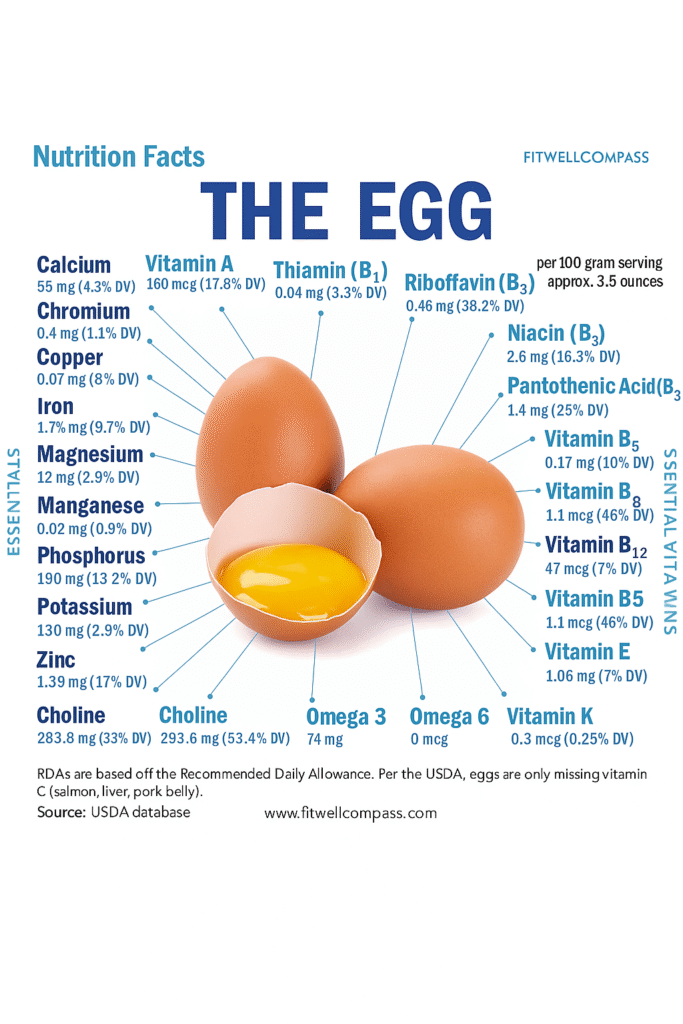Discover the nutritional value of eggs and why this simple, everyday food is considered a powerhouse of essential nutrients. From high-quality protein to vital vitamins like B12 and D, eggs deliver impressive health benefits in every bite. Learn how the nutritional value of eggs supports muscle growth, brain health, and energy levels—making them a smart addition to any balanced diet.
Eggs are one of those foods that have been both celebrated and vilified over the years. But here’s the truth, straight up: eggs are a compact source of powerful nutrients. In one small shell, you’ll find high-quality protein, essential fats, brain-boosting compounds, and a symphony of vitamins and minerals.
Take a look at what a single large egg (about 50g) brings to the table:

| Nutrient | Amount per Egg | % Daily Value |
|---|---|---|
| Calories | 70 kcal | 3.5% |
| Protein | 6.3 g | 13% |
| Total Fat | 5 g | 6% |
| Saturated Fat | 1.6 g | 8% |
| Cholesterol | 186 mg | 62% |
| Sodium | 70 mg | 3% |
| Carbohydrates | 0.6 g | 0% |
| Vitamin D | 1.1 mcg | 6% |
| Vitamin B12 | 0.6 mcg | 25% |
| Selenium | 15.4 mcg | 28% |
| Choline | 147 mg | — |
These values are based on a standard 2,000-calorie diet—but of course, real life is rarely standard.
🥚 More Than Breakfast: Why Eggs Deserve Respect
Let’s move past the numbers and into the real story.
Eggs are kind of amazing. They’re accessible, affordable, and versatile. More importantly, they’re nutritionally dense without being calorie-heavy. In a world full of empty carbs and ultra-processed snacks, an egg is almost refreshingly honest.
Here’s what makes them so good:
- Complete protein: Eggs deliver all nine essential amino acids. That’s not a small thing.
- Choline: This underappreciated nutrient is crucial for brain function, especially in pregnancy. And guess what? Most people don’t get enough.
- Eye-loving antioxidants: Lutein and zeaxanthin help protect against macular degeneration and the wear and tear of digital screen time.
- Healthy fats: No, fat isn’t the enemy. The right kinds of fat, like the ones in eggs, help with hormone production and vitamin absorption.
And yes—eggs contain cholesterol. But don’t panic. For most healthy individuals, dietary cholesterol doesn’t automatically spike blood cholesterol. It’s far more nuanced than we were once told.
🥄 So, How Many Eggs Are Too Many?
This is the part where things get personal.
For most people? Eating one or two eggs a day is totally fine—and possibly even beneficial. Your heart isn’t going to stop because you had scrambled eggs for breakfast.
But context matters. If you’re pairing those eggs with a double stack of pancakes, sausage, and a caramel frappuccino, the egg isn’t the problem. On the other hand, if you’re tossing it into a salad or pairing it with whole grains and avocado toast? Now we’re talking balance.
And if you have specific health conditions, especially related to cholesterol or diabetes? That’s where professional medical advice is your best friend. No article should replace a chat with your doctor.
✅ Bottom Line: Don’t Underestimate the Egg
It’s easy to overlook something so familiar. But the egg is more than just a breakfast sidekick or a binding agent in baking. It’s a nutrient-packed powerhouse, one that supports muscles, fuels your brain, and fits into nearly any meal plan.

